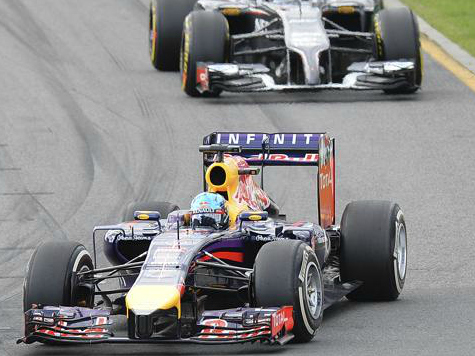With just one race completed in this year’s Formula 1 schedule, new sweeping “green” mandates for the race cars are causing major problems for drivers, promoters, and fans. This year’s revisions are among the most substantial in F1 history, and they’re not sitting well with some of the major players in the sport.
Last June, President Jean Todt of FIA, the governing body for Formula 1, gave remarks that would have been cheered at the UN or any college campus in America, saying, “Motor sport, like all sports, must face the challenges of our times: globalisation, consideration of environmental issues, competition from other sports, the financial crisis.”
Like the NFL, which has come under fire from liberal groups in recent years, many of the F1 changes look to be motivated by the pressures of political correctness, rather than the betterment of the sport, and could ultimately end up harming it.
As part of the greening efforts, F1 requires the engines to become smaller, going from an eight-cylinder engine to six, and have caps on fuel consumption where no engine is allowed to exceed 100kg of fuel per hour. These fuel rates are strictly monitored, and last week’s race in Australia found its first victim of the new rules.
Red Bull’s Daniel Ricciardo placed second in the race, but before the night was over, F1 officials notified the team that Ricciardo had “exceeded the required fuel mass flow of 100kg/h (article 5.1.4 of the Formula 1 technical regulations)”
and was disqualified. As a result, Red Bull did not finish with any points for the day. Red Bull is appealing the decision.
“Red Bull announced their intention to appeal immediately after Sunday’s race in Albert Park, saying: ‘Inconsistencies with the FIA fuel flow meter have been prevalent all weekend up and down the pit lane. The Team and Renault are confident the fuel supplied to the engine is in full compliance with the regulations.'”
Red Bull founder Dietrich Mateschitz, not a fan of the new green standards, added,
“Formula One should be again what it always has been: the ultimate discipline…It is not there to set new records in fuel consumption, or so you can talk at a whisper during a race and the greatest thrill is the squealing of the tires. I consider it equally absurd that we are going a second slower than last year and that the junior series GP2 is almost as fast as formula one with a fraction of the budget.”
Additional changes include the use of turbos and an “Energy Recovery System,” which stores energy generated by braking and harnesses excess energy from the turbo, which is stored in batteries, and made available to the driver when needed. Additionally, for safety reasons, the front end and chassis has been lowered, which coupled with other aerodynamic changes, results in less downforce for the car, which is critical for handling, and keeping the car on the track. The aerodynamic changes make driving the cars much more difficult, though these changes make driver skill at managing the car much more of a factor than in recent years.
Racers are vexed as they try to adapt to the massive green changes. Romain Grosjean says:
“It is not quite as pleasant as before to be honest…there is a lot of energy recovery to deal with and optimize. You cannot drive most of the grand prix at 90% as before; sometimes now it is only 30%. We just have to get used to it…at the moment it feels a little frustrating as a driver but these are the rules, we will adapt and make the best of them.”
It’s not just the teams and racers that are frustrated, but also fans and promoters. Their biggest beef is the sound. The new engines are so much quieter that they are actually distracting to some fans.
According to the Independent, Ron Walker, promoter of the Australian Grand Prix, says that, “The sound is a disgrace. When the car comes down the straight you can’t even hear it. Now you have got every promoter worried that it’s going to turn fans away.”
Walker has even threatened to pull out of future F1 races, saying of the FIA, the governing body of Formula 1, “It doesn’t have the right to destroy this sport…. Out of any single problem, this is the one that will kill the golden goose.”
“We did a survey of the fans and they don’t really care about saving fuel,” Walker said. “They want to go and see gladiatorial drivers fighting each other and not worry about the fuel that they use.”
Formula 1’s own Chief Executive Bernie Ecclestone has voiced disapproval with the changes. He confessed, “I’ve never been happy with these new engines.”
Formula 1 remains at the forefront in technology, and boasts the top racers and teams in the world. F1 has always been able to adapt and overcome to rule and regulation changes in the past, and many of the racers are taking an optimistic approach to the new regulations. It remains to be seen if fans and promoters will share in that optimism, or if the greening of F1 might be a bridge too far.
World Champion Sebastian Vettel clearly falls into the latter category. Earlier this week he offered: “It is s#!+…. I was on the pitwall during the race, and it is better [quieter] than in a bar! I think for the fans it is not good…. I think F1 has to be spectacular–and the sound is one of the most important things.”

COMMENTS
Please let us know if you're having issues with commenting.